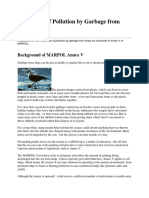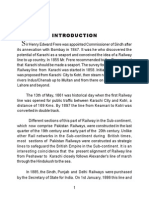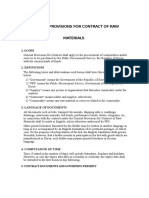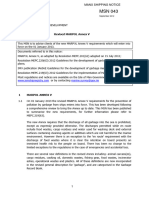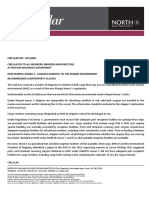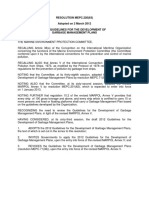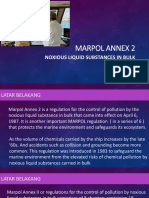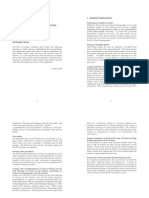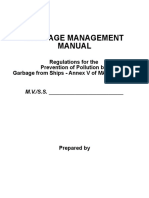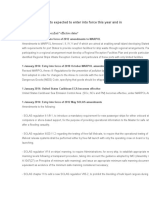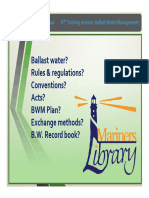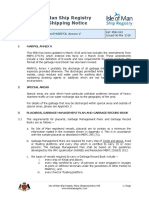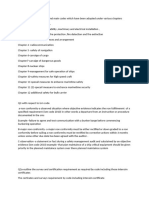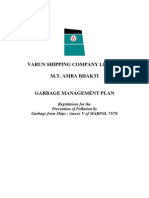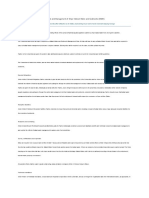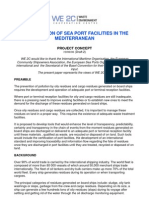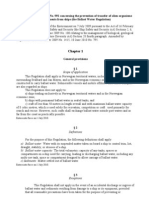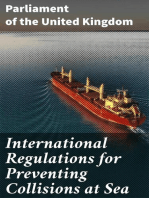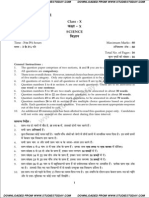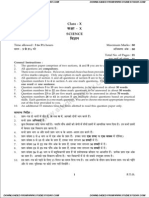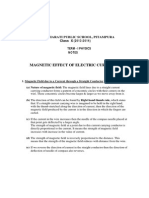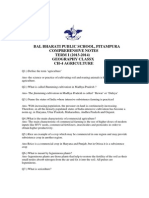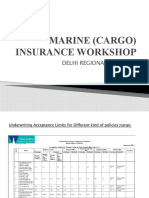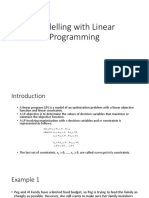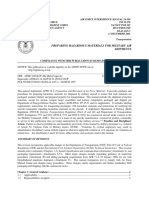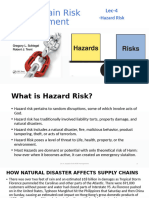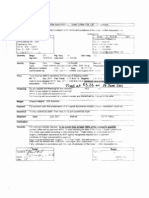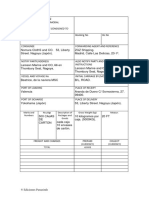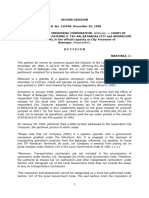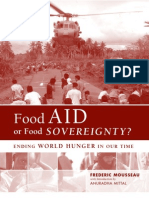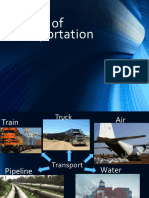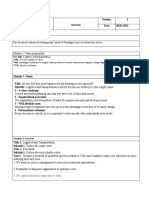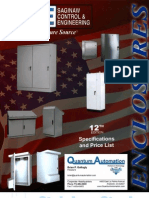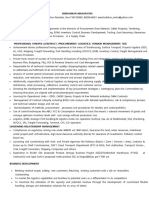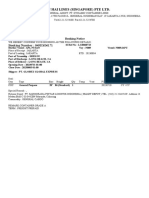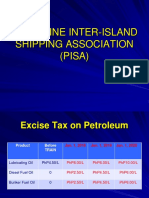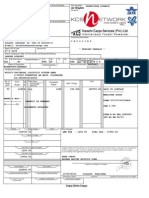MARPOL Annex V 2 PDF
MARPOL Annex V 2 PDF
Uploaded by
ravilullaCopyright:
Available Formats
MARPOL Annex V 2 PDF
MARPOL Annex V 2 PDF
Uploaded by
ravilullaOriginal Title
Copyright
Available Formats
Share this document
Did you find this document useful?
Is this content inappropriate?
Copyright:
Available Formats
MARPOL Annex V 2 PDF
MARPOL Annex V 2 PDF
Uploaded by
ravilullaCopyright:
Available Formats
Guidance on the revised MARPOL Annex V entering into force 1 January 2013.
The chain of responsibilities for implementation of the revised MARPOL Annex V is extended among others to include: Shippers and charterers - obliged to properly declare whether cargoes and/or any cleaning agents supplied are being classed as Harmful to the Marine Environment (HME) Ports and terminals - to provide adequate port reception facilities within special areas and/or when handling cargoes classified as being Harmful to the Marine Environment (HME)
In light of our industrys experiences with IMO Members States not honoring their obligations under MARPOL to ensure that adequate and affordable reception facilities are provided for, the above-mentioned responsibility of ports and terminals could be expected to be a long process in order to meet the full implementation of the revised MARPOL Annex V requirements by all parties. For additional inquiries related to MARPOL Annex V or Solid Bulk cargoes or other marine technical matters, please contact marine@bimco.org
Extracts from the revised MARPOL Annex V related to cargo residues:
Regulation 1 - Definitions 2 Cargo residues means the remnants of any cargo which are not covered by other Annexes to the present Convention and which remain on the deck or in holds following loading or unloading, including loading and unloading excess or spillage, whether in wet or dry conditions or entrained in wash water but does not include cargo dust remaining on the deck after sweeping or dust on the external surfaces of the ship.
5 En route means that the ship is underway at sea on a course or courses, including deviation from the shortest direct route, which as far as practicable for navigational purposes, will cause any discharge to be spread over as great an area of the sea as is reasonable and practicable. 12 Operational wastes means all solid wastes (including slurries) not covered by other Annexes that are collected on board during normal maintenance or operations of a ship, or used for cargo stowage and handling. Operational wastes also include cleaning agents and additives contained in cargo hold and external wash water. Operational wastes does not include grey water, bilge water, or other similar discharges essential to the operation of a ship, taking into account the guidelines developed by the Organization.
Regulation 4 - Discharge of garbage outside special areas 1 Subject to the provisions of regulations 5, 6, and 7 of this Annex, discharge of the following garbage into the sea outside special areas shall only be permitted while the ship is en route and as far as practicable from the nearest land, but in any case not less than: 1.3 12 nautical miles from the nearest land for cargo residues that cannot be recovered using commonly available methods for unloading. These cargo residues shall not contain any substances classified as harmful to the marine environment, taking into account guidelines developed by the Organization.
2 Cleaning agents or additives contained in cargo hold, deck and external surfaces wash water may be discharged into the sea, but these substances must not be harmful to the marine environment, taking into account guidelines developed by the Organization.
Regulation 6 - Discharge of garbage within special areas 1.2 Discharge of cargo residues that cannot be recovered using commonly available methods for unloading, where all the following conditions are satisfied: 2.1 Cargo residues, cleaning agents or additives, contained in hold washing water do not include any substances classified as harmful to the marine environment, taking into account guidelines developed by the Organization; 1.2.2 Both the port of departure and the next port of destination are within the special area and the ship will not transit outside the special area between those ports; 1.2.3 No adequate reception facilities are available at those ports taking into account guidelines developed by the Organization; and 1.2.4 Where the conditions of subparagraphs 2.1, 2.2 and 2.3 of this paragraph have been fulfilled, discharge of cargo hold washing water containing residues shall be made as far as practicable from the nearest land or the nearest ice shelf and not less than 12 nautical miles from the nearest land or the nearest ice shelf. 2 Cleaning agents or additives contained in deck and external surfaces wash water may be discharged into the sea, but only if these substances are not harmful to the marine environment, taking into account guidelines developed by the Organization.
MARPOL Annex V Special Areas
* The Special Area requirements for these areas have not yet taken effect because of lack of notifications from MARPOL Parties whose coastlines border the relevant special areas on the existence of adequate reception facilities (regulations 38.6 of MARPOL Annex I and 5(4) of MARPOL Annex V).
Regulation 8 - Reception facilities 1 Each Party undertakes to ensure the provision of adequate facilities at ports and terminals for the reception of garbage without causing undue delay to ships, and according to the needs of the ships using them. 2 Each Party shall notify the Organization for transmission to the Contracting Parties concerned of all cases where the facilities provided under this regulation are alleged to be inadequate. 3 Reception facilities within special areas .1 Each Party, the coastline of which borders a special area, undertakes to ensure that as soon as possible, in all ports and terminals within the special area, adequate reception facilities are provided, taking into account the needs of ships operating in these areas. .2 Each Party concerned shall notify the Organization of the measures taken pursuant to subparagraph 3.1 of this regulation. Upon receipt of sufficient notifications the Organization shall establish a date from which the requirements of regulation 6 of this Annex in respect of the area in question are to take effect. The Organization shall notify all Parties of the date so established no less than twelve months in advance of that date. Until the date so established, ships that are navigating in a special area shall comply with the requirements of regulation 4 of this Annex as regards discharges outside special areas.
Hold Washing Water & Cargo Residues
Cargo residues and hold washing water can still be discharged into the sea if certain criteria are fulfilled i.e. the discharge is done outside a MARPOL Annex V special Area or the cargo in question is not classified as Harmful to the Marine Environment (HME).
Residues of cargoes classified as HME are not allowed to be discharged and have to be delivered to a port reception facility. Ships carrying cargo classified as HME are likewise not allowed to pump hold bilges overboard. Deliveries of HME cargo residues and hold washing originating from HME cargoes have to be fully proven and documented in the ships garbage record book. The Guidelines include definitions for HME for both cargoes and cleaning agents Shippers must declare whether a cargo is or is not HME in the declaration required by section 4.2 of the IMSBC Code. Cleaning agents can be discharged into the sea if declared or proven not harmful to the marine environment. The ships should have on board documented evidence from the producer(s) of the cleaning agent(s) that the criteria for not being harmful to the marine environment are met.
Implementation of MARPOL Annex V - Provisional classification of solid bulk cargoes under the revised MARPOL Annex V between 1 January 2013 and 31 December 2014 The IMO Marine Environment Protection Committee (MEPC) after having considered the challenges associated with the classification of solid bulk cargoes and discharge of associated cargo residues in accordance with the requirements of the revised MARPOL Annex V recognized that a transitional period for the implementation of this aspect of MARPOL Annex V would greatly facilitate maritime trade of solid bulk cargoes. The MEPC agreed that such a transitional period for the implementation of this aspect of MARPOL Annex V only would contribute with minimal additional risk to the marine environment and agreed to issue the MEPC1. Circular 791 related to the implementation of the revised MARPOL Annex V and in particular the need for provisional classification of solid bulk cargoes under the revised MARPOL Annex V between 1 January 2013 and 31 December 2014.
BIMCO Members are reminded of the BIMCO Hold Cleaning/Residue Disposal Clause For Time Charter Parties a) The Charterers may request the Owners to direct the crew to sweep and/or wash and/or clean the holds between voyages and/or between cargoes against payment at the rate of . per hold, provided the crew is able safely to undertake such work and is allowed to do so by local regulations. In connection with any such operation the Owners shall not be responsible if the Vessel's holds are not accepted or passed. Time for cleaning shall be for the Charterers account. b) All materials (including chemicals and detergents) required for cleaning of cargo holds shall be supplied by and paid for by the Charterers. c) Throughout the currency of this Charter Party and at redelivery, the Charterers shall remain responsible for all costs and time, including deviation, if any, associated with the removal and disposal of cargo related residues and/or hold washing water and/or chemicals and detergents and/or waste as defined by MARPOL Annex V, Regulation 1 or other applicable rules relating to the disposal of such substances.
List of references:
Revised MARPOL Annex V
2012 Guidelines for the Implementation of MARPOL Annex V MEPC.1/Circ.791 Implementation of MARPOL Annex V: Provisional classification of solid bulk cargoes under the revised MARPOL Annex V between 1 January 2013 and 31 December 2014 MEPC.1/Circ.469/Rev.1 Revised Consolidated Format for Reporting Alleged Inadequacies of Port Reception Facilities The Global Integrated Shipping information System (GISIS) - an online database providing access to among others information related to Port Reception Facilities and Contact Points Please note that users have to register in order to be granted access and use of the GISIS that likewise have supersede a number of IMO circulars and documents! For further information and registration please go to the GISIS website http://gisis.imo.org/Public/Default.aspx For further information please visit www.bimco.org
You might also like
- HSE-SOP-14 Transportation Logistics Safety ManagementDocument29 pagesHSE-SOP-14 Transportation Logistics Safety ManagementPerwez2191% (11)
- E HailingDocument19 pagesE Hailingcuihuan996No ratings yet
- Cement Carrier PDFDocument35 pagesCement Carrier PDFSaurabh Yadav100% (1)
- Garbage Management PlanDocument26 pagesGarbage Management Plankhanhsonphams100% (5)
- Annex II SummaryDocument10 pagesAnnex II Summarysukhjit78No ratings yet
- Prevention of Pollution by Garbage From ShipsDocument5 pagesPrevention of Pollution by Garbage From Shipsrares angNo ratings yet
- Railway History of PakistanDocument79 pagesRailway History of Pakistanرضا خټکNo ratings yet
- Raw Material Supply ContractDocument9 pagesRaw Material Supply ContractJoel GeorgeNo ratings yet
- MARENV Rev. Week 10 annex 5bDocument6 pagesMARENV Rev. Week 10 annex 5bNoel SantosNo ratings yet
- (Prevention Of) Pollution by Sewage From ShipsDocument7 pages(Prevention Of) Pollution by Sewage From ShipsLyka LykaNo ratings yet
- Sewage - RegulationsDocument5 pagesSewage - Regulationsankit.jadhav263No ratings yet
- Revised MARPOL Annex VDocument6 pagesRevised MARPOL Annex VDiana MoralesNo ratings yet
- Annex V (Application) : - Unless Expressly Provided Otherwise, The Provisions of This Annex Shall Apply To All ShipsDocument71 pagesAnnex V (Application) : - Unless Expressly Provided Otherwise, The Provisions of This Annex Shall Apply To All ShipsAshutosh Kumar SinghNo ratings yet
- Marpol Annex 1 and 2.NABASADocument9 pagesMarpol Annex 1 and 2.NABASAFreakNo ratings yet
- GMP - UniverseDocument27 pagesGMP - UniverseShahid Ali Syed100% (1)
- Marpol Annex V GarbDocument11 pagesMarpol Annex V GarbkhaljaharNo ratings yet
- Annex II (NLS)Document6 pagesAnnex II (NLS)Carlo ValdezNo ratings yet
- Mar Env:: Protection of The Marine EnvironmentDocument9 pagesMar Env:: Protection of The Marine EnvironmentHaeisy SimsuangcoNo ratings yet
- Revised Annex VI Regulation 12 Guidance Notes Marpol VIDocument25 pagesRevised Annex VI Regulation 12 Guidance Notes Marpol VIemiliotNo ratings yet
- MARENV Rev. Week 7-8 annex 4Document5 pagesMARENV Rev. Week 7-8 annex 4Noel SantosNo ratings yet
- A Guide To Handling Garbage On ShipsDocument5 pagesA Guide To Handling Garbage On ShipsGiorgi KandelakiNo ratings yet
- MARPOL 1 To 6Document9 pagesMARPOL 1 To 6Jaycel Custodio100% (1)
- NORTH OF ENGLAND P&I ASSOCIATION LIMITED 100 The Quayside, Newcastle Upon Tyne, UK, NE1 3DUDocument3 pagesNORTH OF ENGLAND P&I ASSOCIATION LIMITED 100 The Quayside, Newcastle Upon Tyne, UK, NE1 3DUNishadYadavNo ratings yet
- Mar Env:: Protection of The Marine EnvironmentDocument9 pagesMar Env:: Protection of The Marine EnvironmentHaeisy SimsuangcoNo ratings yet
- Marpol Annex 2Document19 pagesMarpol Annex 2Mohammed Shaji E IMU KochiNo ratings yet
- Annex 4 Week 5Document45 pagesAnnex 4 Week 5Joshua DilaoNo ratings yet
- Update On The Implementation of The Ballast Water Management Convention (BWMC), 2004Document17 pagesUpdate On The Implementation of The Ballast Water Management Convention (BWMC), 2004Sanjiv KumarNo ratings yet
- MARPOL Annex 2Document7 pagesMARPOL Annex 2Leo Keith JocsonNo ratings yet
- Marpol SummaryDocument5 pagesMarpol SummaryrigelNo ratings yet
- MSN 1832 (M) : The Merchant Shipping (Port State Control) Regulations 2011Document10 pagesMSN 1832 (M) : The Merchant Shipping (Port State Control) Regulations 2011Vadim RayevskyNo ratings yet
- RESOLUTION MEPC.220 (63) Guidelines For The Development of Garbage Management PlansDocument5 pagesRESOLUTION MEPC.220 (63) Guidelines For The Development of Garbage Management Plansfajee_faridNo ratings yet
- UntitledDocument3 pagesUntitledEdward SpiegelNo ratings yet
- Marpol Annex 2Document15 pagesMarpol Annex 2Syahrul YahyaNo ratings yet
- Revention of Pollution by Sewage From ShipsDocument2 pagesRevention of Pollution by Sewage From Shipstharindu hasarangaNo ratings yet
- 159Document4 pages159hugo YangNo ratings yet
- Assignment1 MejiaDocument5 pagesAssignment1 MejiaMarianne Jubille CataquisNo ratings yet
- Annnex 1 NoteDocument12 pagesAnnnex 1 Notealfa89pNo ratings yet
- Berth OperatorDocument8 pagesBerth Operatorabang-abangNo ratings yet
- Garbage ManualDocument20 pagesGarbage ManualAntonio AntonioNo ratings yet
- Solas Marpol AmendmentsDocument10 pagesSolas Marpol Amendmentshajee2076No ratings yet
- Min 544 (M+F)Document10 pagesMin 544 (M+F)mustafasuliman153No ratings yet
- Standard P&a ManualDocument16 pagesStandard P&a ManualVasant Kumar Varma100% (1)
- List of Amendments Expected To Enter Into Force This Year and in The Coming YearsDocument3 pagesList of Amendments Expected To Enter Into Force This Year and in The Coming Yearsbittu692No ratings yet
- Ballast TrainingDocument29 pagesBallast TrainingAkash NairNo ratings yet
- Annex Ii: Regulations For The Pollution by Noxious Liquid Substances in BulkDocument35 pagesAnnex Ii: Regulations For The Pollution by Noxious Liquid Substances in BulkBhupender RamchandaniNo ratings yet
- Annex 25 RESOLUTION MEPC.220 (63) Adopted On 2 March 2012 2012 Guidelines For The Development of Garbage Management PlansDocument5 pagesAnnex 25 RESOLUTION MEPC.220 (63) Adopted On 2 March 2012 2012 Guidelines For The Development of Garbage Management Planshpss77No ratings yet
- MSN 043 Revised Marpol Annex VDocument12 pagesMSN 043 Revised Marpol Annex VwisnukerNo ratings yet
- ESP - Booklet For Bulk Carriers (Including Ore Carriers) - tcm155-206340Document71 pagesESP - Booklet For Bulk Carriers (Including Ore Carriers) - tcm155-206340Jusak Sonang Siahaan100% (1)
- MS Notice 31 of 2009 - Iron Ore FinesDocument5 pagesMS Notice 31 of 2009 - Iron Ore FinesReza AhmedNo ratings yet
- Rotterdam Port by Laws 2020 July 2023Document67 pagesRotterdam Port by Laws 2020 July 2023rodion.ishmuratovNo ratings yet
- Khuram Sir TutorialDocument10 pagesKhuram Sir Tutorialomkar446No ratings yet
- Marpol - SewageDocument5 pagesMarpol - SewageRustam RiyadiNo ratings yet
- Marpol Annex VDocument3 pagesMarpol Annex VJulio Chavez DiazNo ratings yet
- International Convention For The Control and Management of Ships' Ballast Water and Sediments (BWM)Document8 pagesInternational Convention For The Control and Management of Ships' Ballast Water and Sediments (BWM)richard icalaNo ratings yet
- Garbage Management PlanDocument20 pagesGarbage Management Planmcrannn80% (5)
- International Convention For The Control and Management of Ships' Ballast Water and Sediments (BWM)Document8 pagesInternational Convention For The Control and Management of Ships' Ballast Water and Sediments (BWM)denis_john_2No ratings yet
- STS Extract From MarineDocument7 pagesSTS Extract From MarineWirote Archeepkosol100% (1)
- Imo Conventions - Marpol Annex IIDocument28 pagesImo Conventions - Marpol Annex IIachi jijavadzeNo ratings yet
- 8 MARPOL Annex V Rudens 10092016 SaisinataisDocument8 pages8 MARPOL Annex V Rudens 10092016 SaisinataisВладислав ЛеоновNo ratings yet
- Regulation 1 Regulation 2 Regulation 3 Regulation 4 Regulation 5 Regulation 6 Regulation 7 Regulation 8 Regulation 9 AppendixDocument10 pagesRegulation 1 Regulation 2 Regulation 3 Regulation 4 Regulation 5 Regulation 6 Regulation 7 Regulation 8 Regulation 9 AppendixAnonymous 7gJ9alpNo ratings yet
- Annex 4 PDFDocument19 pagesAnnex 4 PDFBhupinder MarriyaNo ratings yet
- Chem We2c Draft Project Certification of Mediterranean Port Facilities 190808Document9 pagesChem We2c Draft Project Certification of Mediterranean Port Facilities 190808bundaran_imutNo ratings yet
- Norway Ballast Water ExchangeDocument18 pagesNorway Ballast Water ExchangeLoka Radhakrishna Narasaiah0% (1)
- International Regulations for Preventing Collisions at SeaFrom EverandInternational Regulations for Preventing Collisions at SeaNo ratings yet
- Transportation in Animals and PlantsDocument3 pagesTransportation in Animals and Plantsravilulla100% (1)
- CBSE Class 10 Science Question Paper SA 2 2012Document16 pagesCBSE Class 10 Science Question Paper SA 2 2012ravilullaNo ratings yet
- CBSE Class 10 Science Question Paper SA 2 2012Document16 pagesCBSE Class 10 Science Question Paper SA 2 2012ravilullaNo ratings yet
- CBSE Class 10 Science Question Paper SA1 2010Document21 pagesCBSE Class 10 Science Question Paper SA1 2010honey1002No ratings yet
- Class 10 - Phy - Magnetic Effect of Current - TERM IDocument8 pagesClass 10 - Phy - Magnetic Effect of Current - TERM ITapas BanerjeeNo ratings yet
- Class 10 - Electricity - Term IDocument6 pagesClass 10 - Electricity - Term IravilullaNo ratings yet
- CBSE Class 9 Mathematics Sample Paper 2014Document14 pagesCBSE Class 9 Mathematics Sample Paper 2014ravilullaNo ratings yet
- Agriculture ClassX Geog Term1Document13 pagesAgriculture ClassX Geog Term1Tapas BanerjeeNo ratings yet
- IMSBC Code.55-61 - AluminaDocument7 pagesIMSBC Code.55-61 - AluminaFuckYouMotherFucker6No ratings yet
- Marine (Cargo) Insurance WorkshopDocument17 pagesMarine (Cargo) Insurance Workshoppinki jainNo ratings yet
- 1-Modelling With Linear ProgrammingDocument8 pages1-Modelling With Linear ProgrammingHonest0% (1)
- C14 - PAS 2 InventoriesDocument20 pagesC14 - PAS 2 InventoriesAllaine ElfaNo ratings yet
- AfmanDocument396 pagesAfmanFaheem RezviNo ratings yet
- Lec 4 Hazard Risk in SCRMDocument31 pagesLec 4 Hazard Risk in SCRMpal 8311No ratings yet
- Export MarketingDocument74 pagesExport MarketingkaurpreetgillNo ratings yet
- (' .Cdi Cenfr 0 ::.:" I (Jrent@coopcoffees: '.:WLLTWDocument4 pages(' .Cdi Cenfr 0 ::.:" I (Jrent@coopcoffees: '.:WLLTWcoffeepathNo ratings yet
- TranspoDocument151 pagesTranspodanaNo ratings yet
- Modelo Editable de Conocimiento de Embarque Marítimo BL - FormDocument2 pagesModelo Editable de Conocimiento de Embarque Marítimo BL - FormAntonío IvailovNo ratings yet
- Ford F150 BrochureDocument31 pagesFord F150 BrochureAbhishekNo ratings yet
- Keng Hua Paper Products Co Inc Vs CA - 116863 - February 12, 1998 - JDocument8 pagesKeng Hua Paper Products Co Inc Vs CA - 116863 - February 12, 1998 - JulticonNo ratings yet
- Transportation Law Case DigestDocument69 pagesTransportation Law Case DigestNel PasaizNo ratings yet
- Kuehne+Nagel Vietnam Company ProfileDocument56 pagesKuehne+Nagel Vietnam Company Profilethuy dinhNo ratings yet
- Food Aid or Food SovereigntyDocument48 pagesFood Aid or Food SovereigntyAlanna Howell100% (1)
- Modes of TransportationDocument15 pagesModes of TransportationVictorNo ratings yet
- 001 Home Page - Standard GoDocument6 pages001 Home Page - Standard Gokleyver Movilla HoyosNo ratings yet
- Saginaw Enclosures Catalog 12Document345 pagesSaginaw Enclosures Catalog 12QuantumAutomationNo ratings yet
- Georgia Logistics SOPs 080915Document3 pagesGeorgia Logistics SOPs 080915Faysal AhmedNo ratings yet
- CV of Subhankar Mahapatra B Tech, NIT - Rourkela and MBA XIMB Over 22 Years of ExperienceDocument8 pagesCV of Subhankar Mahapatra B Tech, NIT - Rourkela and MBA XIMB Over 22 Years of ExperienceSubhankar MahapatraNo ratings yet
- Q88 AbbreviationsDocument16 pagesQ88 Abbreviationsnoz1989No ratings yet
- C-TPAT Audit Report: General Overview of The Audit's FindingsDocument17 pagesC-TPAT Audit Report: General Overview of The Audit's FindingsArsalan Ahmed Sheikh100% (1)
- 049DX06171 Brmao 0.5F Globex R1Document2 pages049DX06171 Brmao 0.5F Globex R1Riko ApriliantoNo ratings yet
- Excise Tax Effect On Petroleum by Atty Pedro Aguilar, Executive Director of The Philippine Inter-Island Shipping AssociationDocument8 pagesExcise Tax Effect On Petroleum by Atty Pedro Aguilar, Executive Director of The Philippine Inter-Island Shipping AssociationPortCalls100% (1)
- AWB 250-11855093jkjDocument1 pageAWB 250-11855093jkjAmmar AhmedNo ratings yet





